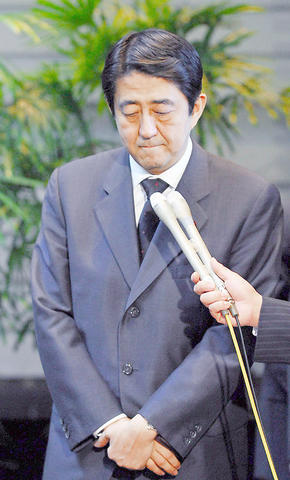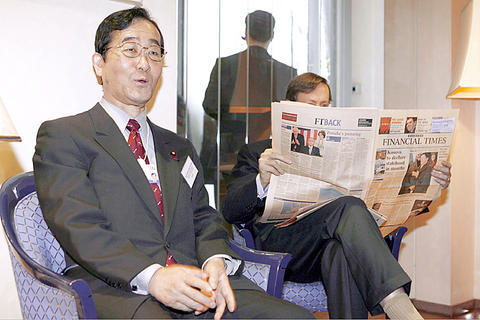A scandal-tainted minister in Prime Minister Shinzo Abe's Cabinet committed suicide yesterday, compounding problems for the Japanese leader whose support has slumped ahead of a July election.
It was the first suicide by a Cabinet minister since the days after Japan's defeat in World War II, officials said.
"This will have serious political fallout, but at this point it's hard to tell how much," a government official said.

PHOTO: AFP
Agriculture, Fisheries and Forests Minister Toshikatsu Matsuoka's suicide came as Abe's public support rate fell to its lowest level since he took office last September, due largely to voter anger over mismanagement of pension premiums.
The dent in Abe's popularity had already increased chances that his ruling camp would lose its majority in the election for parliament's upper house, his first big test at the polls.
Matsuoka was found unconscious in a residence for lawmakers in Tokyo and rushed to a hospital where he died.

PHOTO: AFP
Matsuoka's death will have "a significant impact on this Cabinet, this administration," Abe said.
"As the one who appointed Minister Matsuoka to the post, I feel responsible for the action taken by a Cabinet member," he said.
Abe had earlier looked visibly shaken after seeing Matsuoka's body at the hospital.
"It is extremely unfortunate and I am overwhelmed with regret. I want to pray for the rest of his soul," Abe said. "I had an opportunity to see his face. He had a very peaceful face."
Police declined to comment on reports in the Japanese media, including public broadcaster NHK, that he had left a suicide note and hanged himself.
News reports said the 62-year-old hanged himself while in his pyjamas using a dog leash attached to his living room door.
Matsuoka was embroiled in a scandal involving political funding and bid-rigging. Two committees set up to back his electoral campaigns allegedly received money from a group of businesses which then made bids for public works projects doled out by the government, according to media reports.
Prosecutors last week arrested two senior officials of the government body embroiled in the scandal, which involved contracts for building forest roads in Matsuoka's home district.
Matsuoka, a career agriculture ministry bureaucrat turned politician, had also come under fire for allegedly claiming utility bills of up to ¥29 million (US$240,000) over five years, even though he rented a parliamentary office where utility costs are free. Matsuoka had repeatedly denied any wrongdoing.
He was scheduled to appear before a parliamentary committee yesterday afternoon for questioning.
Abe's government was just hit by a fresh scandal last week over the missing pension payment records for more than 50 million people, who have been unable to get the money they are entitled to receive.
Support for the Cabinet has hit its lowest level since Abe took office last year.
Approval of the Cabinet fell to 32 percent, down 11 percentage points from a similar poll last month, according to a survey released yesterday by the Mainichi Shimbun.
A separate poll by the Nikkei Shimbun showed Abe's popularity falling to 41 percent, down 12 percentage points from the previous month.
Both cited dissatisfaction with the government's apparent loss of the pension payment records.

MORE VISITORS: The Tourism Administration said that it is seeing positive prospects in its efforts to expand the tourism market in North America and Europe Taiwan has been ranked as the cheapest place in the world to travel to this year, based on a list recommended by NerdWallet. The San Francisco-based personal finance company said that Taiwan topped the list of 16 nations it chose for budget travelers because US tourists do not need visas and travelers can easily have a good meal for less than US$10. A bus ride in Taipei costs just under US$0.50, while subway rides start at US$0.60, the firm said, adding that public transportation in Taiwan is easy to navigate. The firm also called Taiwan a “food lover’s paradise,” citing inexpensive breakfast stalls

TRADE: A mandatory declaration of origin for manufactured goods bound for the US is to take effect on May 7 to block China from exploiting Taiwan’s trade channels All products manufactured in Taiwan and exported to the US must include a signed declaration of origin starting on May 7, the Bureau of Foreign Trade announced yesterday. US President Donald Trump on April 2 imposed a 32 percent tariff on imports from Taiwan, but one week later announced a 90-day pause on its implementation. However, a universal 10 percent tariff was immediately applied to most imports from around the world. On April 12, the Trump administration further exempted computers, smartphones and semiconductors from the new tariffs. In response, President William Lai’s (賴清德) administration has introduced a series of countermeasures to support affected

CROSS-STRAIT: The vast majority of Taiwanese support maintaining the ‘status quo,’ while concern is rising about Beijing’s influence operations More than eight out of 10 Taiwanese reject Beijing’s “one country, two systems” framework for cross-strait relations, according to a survey released by the Mainland Affairs Council (MAC) on Thursday. The MAC’s latest quarterly survey found that 84.4 percent of respondents opposed Beijing’s “one country, two systems” formula for handling cross-strait relations — a figure consistent with past polling. Over the past three years, opposition to the framework has remained high, ranging from a low of 83.6 percent in April 2023 to a peak of 89.6 percent in April last year. In the most recent poll, 82.5 percent also rejected China’s

PLUGGING HOLES: The amendments would bring the legislation in line with systems found in other countries such as Japan and the US, Legislator Chen Kuan-ting said Democratic Progressive Party (DPP) Legislator Chen Kuan-ting (陳冠廷) has proposed amending national security legislation amid a spate of espionage cases. Potential gaps in security vetting procedures for personnel with access to sensitive information prompted him to propose the amendments, which would introduce changes to Article 14 of the Classified National Security Information Protection Act (國家機密保護法), Chen said yesterday. The proposal, which aims to enhance interagency vetting procedures and reduce the risk of classified information leaks, would establish a comprehensive security clearance system in Taiwan, he said. The amendment would require character and loyalty checks for civil servants and intelligence personnel prior to